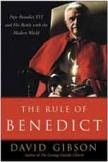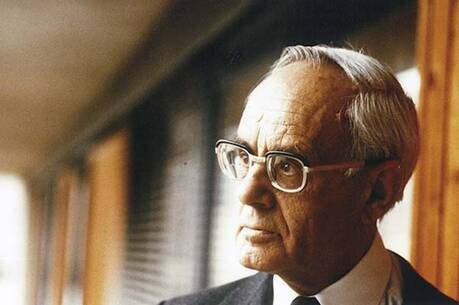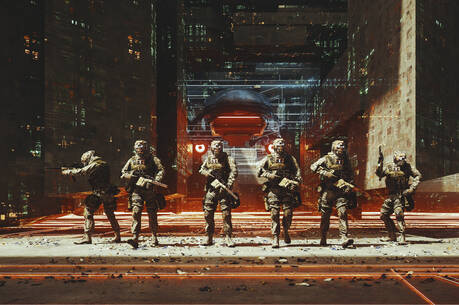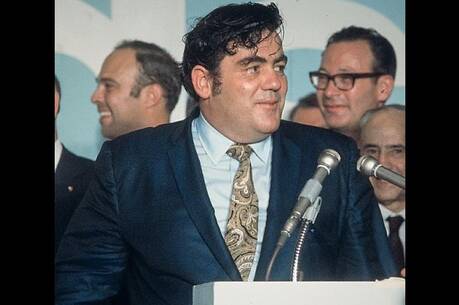Facing a Fragmented Church
In the highly charged and fertile theological world out of which Vatican II was born, there was widespread agreement that the Catholic Church needed to rethink itself. Stale Thomistic recitations seemed out of step with emerging ways of looking at Christ, the world, the liturgy, the role of both ordained and lay.
When the era’s legendary theologiansRahner, DeLubac, Schillebeeckx, von Balthasar, Küng, Chenu, Daniélou among thembegan to mix it up as draft after draft of documents were thought through, argued over and finally written down, two distinct kinds of rethinking emerged. One was the optimistic, world- engaging, window-opening updating or aggiornamento of Pope John XXIII. The other was a renewal by going back to Christianity’s sources, ressourcement, a far more sober view of humankind and the need of the church to maintain both its primacy and its distance from directly engaging modernity. One of its brilliant pointiers was a German priest in his mid-30’s, one Joseph Ratzinger.
So when one hears these days about the vision or the legacy of Vatican IIas so many voices are lifted up in support of the historic councilit must always be asked: but from what point of view?
In his new book, The Rule of Benedict: Pope Benedict XVI and His Battle With the Modern World, David Gibson carefully follows the path of the onetimeand reluctantNazi youth through some amazing reversals in his own vision for the church, his role as Pope John Paul II’s enforcer of church teachings as head of the Congregation for the Doctrine of the Faith and on to the papacy.
While then-Father Ratzinger never quite shook his somewhat pessimistic, Augustinian view of secular society, there was a certain Ratzinger Spring before, during and even briefly after the council in 1962-65. Ratzinger called for such revolutionary changes as intellectual freedom for theologians like himself to follow their thoughts without fear of reprisal, national or regional councils of bishops that would exercise decentralized authority and synods where the hierarchy and pope reasoned and prayed their way through difficult issues.
But the thought of actually allowing such freedoms would come to alarm the younger Ratzinger. The European youth movements of the 1960’s and the liturgical fantasias that followed, unshackling the universal church from the rigidities of the Latin MassRatzinger once called the post-Vatican II rite a fabricated liturgywere evidence to him that only the Church Stable could withstand such excesses. He drew back into an apologetic mode and would spend the rest of his life both writing about and enforcing what he considered proper doctrine. The Christian believer is a simple person, he preached in a sermon in 1979. Bishops should protect the faith of these little people against the power of intellectuals.
What David Gibsonwho worked in Vatican Radio and wrote the insightful The Coming Catholic Churchprovides in this book is both a clearly drawn character study and a template. If Ratzinger’s life over the last 40 yearsmost of it spent in Rome’s inner circleis any evidence, Benedict is not a man who will readily go outside those lines. As Gibson writes, He has the academic nature of an intellectual, but an intellectual who uses his thought to make sense of the presuppositions he brings.
Gibson’s own outlook is not difficult to discern; an ominous photo of Benedict cast in shadows on the cover sets the tone. But what this extraordinarily well-written, informative, insightful and page-turning (yes, it is a page-turner) book provides is Gibson’s picture of a modern man leading a modern church who clearly views engagement with the modern world as a dead end.
As Gibson summarizes Benedict’s outlook: The modern world is more dangerous than we ever imagined, and by flirting with the spirit of the age’...the church was betraying itself. The only solution was a retreat to faith in Christ as expressed by the Roman Catholic Church. Only personal piety and adherence to church teaching will ultimately prevail. He is not the accommodating pastor, he is the unflinching leader. Even if it be, as Gibson says, of a dedicated minority of orthodox believers.
Benedict surely sees that a struggle for the soul of Catholicism is underway. Will his answer be simply to jettison those who cannot abide a Rome- and magisterium-driven church, one that as a theologian he himself once challenged? He once criticized the very office he would eventually lead, the Congregation for the Doctrine of the Faith, then called the Holy Office, for being an all too smoothly functioning central teaching office which prejudged every question almost before it had come up for discussion.
In the end, it does little good merely to dredge up quote upon quote from a younger man’s life if we are the only ones reading them and pronouncing, See, told you so, or, alternately, Thank the Lord he got that out of his system. Benedict XVI looks out over not only a fragmented church, but also a troubled people, many of whom honor the pope but pay little attention to church matters and the theological distinctions he so treasures. Yet these people want to find in Catholicism the inspiration for their lives, a haven in the storm, an accessible Savior ready to walk along with them on their individual paths.
As John XXIII said, after confirming that the church will steadfastly oppose error, the Spouse of Christ prefers to make use of the medicine of mercy rather than that of severity.
Is the doctor in?
This article also appeared in print, under the headline “Facing a Fragmented Church,” in the October 9, 2006, issue.








